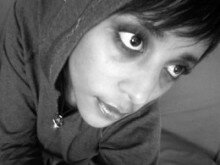
Ronelda S Kamfer has entered Afrikaans literature like a Guy Fawkes’ rocket at Pentecost. This remarkable poet was born in 1981 to parents who lived in Blackheath in the Cape. At the age of three, she went to stay with her grandparents, labourers on a Grabouw fruit farm. At ten, she returned to her parents in Blackheath and later moved to Eersterivier on the Cape Flats where she encountered firsthand the legendary gang culture.
The poetry of Kamfer, in her mid-twenties, is being hailed as fresh, artless, raw and intelligent. Her poem ‘The Housewife’ is a good example of this, but English readers will have to wait a while for the translation of this young debutante’s more complex poems.
Her best poems create a sense of inevitable expression, as if, despite the manifest freshness, they have existed since the beginning of time. However, it is not only in expressive power, which often characterises the work of younger poets, that she shines, but also in her furtive, seering insight, not least into character. This gives the impression that she has a latent poetic reservoir.
Her strongest works contain a paradoxical twist, which could easily go unnoticed. Yet, for the reader who sees it, a chasm opens suddenly. This is her unadulterated lyrical power – sotte voce, but uncompromising.
Kamfer sheds a harsh light on the still marginalised life of South Africa’s “brown communities”. This shines on the racial faultline that continues to divide Afrikaner culture and on that uneasy territory where the Afrikaans language was integrated into the so-called Coloured community long before white Afrikaners claimed it it as the flagship of their nationalism and identity.
Thus she addresses her white counterparts:
I speak your language
I eat your food
I stay in your fatherland
I drink your wine
I sing your music
and my dear uncles I, yes I, make out with your sons
so there,
with a tear in my eye, I’ll conclude
with a quote from Jabu Terre’Blanche
the neighbours’ adopted son:
“check out my new shirt
my mama bought
at the korporasie in Elgin
it’s two-toned so it go wif eweryfing”.
Or is it the other way round? You speak my language, you eat my food?
A quiet irony starkly underlies much of what she has to say. In the tone of her reserve lies a sting that should not be underestimated, but this is not “political poetry”. It is, rather, political reality experienced in intensely private terms.
Bibliography
Noudat Slaapende Honde, Kwela, Cape Town, 2008
My Ousie is ’n Blom, Charl-Pierre Naudé (Editor), Snailpress, Cape Town, 2005
Links
Interview of Ronelda Kamfer by Fred de Vries
Video of Ronelda Kamfer reading from Noudat Slaapende Honde
Launch of Noudat Slaapende Honde (Article in Afrikaans)

